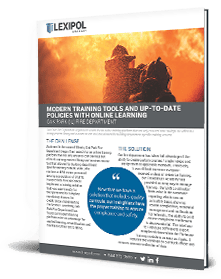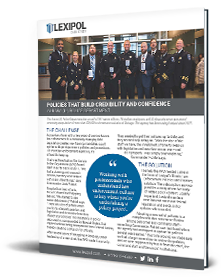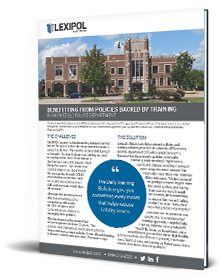The Challenge
Shortly after Chief Steven Vaccaro joined the Mokena Police Department (MPD), the Village attorney asked for a copy of the department’s manual. When Chief Vaccaro provided it, the reply came back: “Where is the rest of your manual?”
The policy manual Chief Vaccaro inherited was sparse—about 24 policies. “The policies were very outdated, and there were not many of them,”
Chief Vaccaro says. “There were several areas not covered by policy—operational issues, patrol issues, personnel issues.” What policies the department did have were stored in a binder, with no electronic access. Chief Vaccaro knew these policy gaps and out-of-date policies posed a liability for the department. With the Village attorney’s support, he started to put together a plan to rectify the situation.
The Solution
Due to his prior experience, Chief Vaccaro’s plan centered around implementing Lexipol’s Illinois Policies and Training service. “I was at the Tinley Park Police Department for 24 years, and toward the end of my time there a new chief came in and implemented Lexipol,” he says. “He assigned the project to me, so I started working with Lexipol in 2012.”
The structure of Lexipol’s policy manual impressed Chief Vaccaro right away. “The policies presented to Illinois agencies are Illinois-specific; these are not just broad, general policies that leave you having to do research,” he says. “Lexipol’s attorneys do a great job of vetting the policies and ensuring they meet state and federal statutory requirements.”
With the Village leadership on board, Chief Vaccaro assigned a sergeant to lead the implementation of the new policies. “We encouraged input from the supervisory staff and we used subject matter experts within the department to assist us with specific policies like juvenile custody, evidence processing, property room, DUI and crash investigation,” he says.
Chief Vaccaro then rolled out the new policies in batches of about 8 to 10 policies, asking officers to review and acknowledge them. “That eased staff into the new manual, versus dropping an entire manual on them and giving them 30 days to learn it all,” he says. “This made the transition much easier for them to accept.”
The MPD is also using Lexipol’s Daily Training Bulletins (DTBs) to train officers on the application of the department’s policies to real-world situations. Chief Vaccaro says the officers like the DTBs better than the policy reviews the department conducted on its own. “The DTBs are relevant, they keep the policy manual in the forefront and they keep you on task,” he says.
The Results
Although there was some initial resistance, MPD personnel have come to accept the policies and understand the important role policy plays in protecting them. “When I was the new guy coming in the door and issuing this new policy manual, it was natural for the officers to assume I was looking to hang them out to dry,” Chief Vaccaro says. “But any chief implementing new policies knows that’s the farthest thing from the truth—you’re doing it because you’re looking out for the best interests of the police officers, the department and the city or the village. Today, everyone understands why we need the manual and that it protects you by giving you guidelines to help you do your job.”
The benefit extends beyond the policy content to the platform itself. Because the MPD’s policies and training bulletins are now online, they are much more accessible than when they were trapped in a binder.
“Recently I was away for the weekend and I needed to know what one of our policies said, and I found it immediately by using the Lexipol mobile app,” Chief Vaccaro says. “It’s a wonderful tool; it puts your policy manual at your fingertips.”
Having access to comprehensive policy guidance “makes my officers’ jobs easier and more understandable,” Chief Vaccaro says. “When they have a question, they go right to the manual. Before, they didn’t have anything they could consult—they had to ask a supervisor, who usually had to ask their supervisor.”
Chief Vaccaro credits the development of the MPD’s policy manual with building a common understanding of the department’s operations, which in turn has increased productivity. “We all know the policies and we’re all on the same page,” he says. “We don’t have people doing things four different ways. Lexipol has helped us to become more progressive as a department and to better serve our community. We’re spending less time figuring out how to do things and more time out there doing them.”




